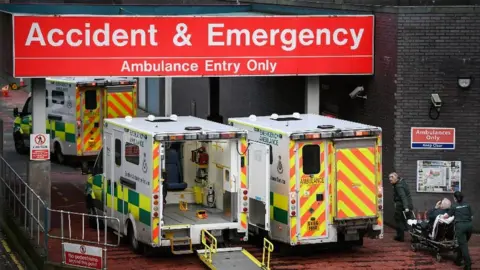Patient's 84-hour wait in A&E 'horrendous' - Douglas Ross
The "horrendous" case of a patient who waited 84 hours for treatment in A&E was highlighted at FMQs by the Scottish Conservative leader.
Douglas Ross said research by his party had uncovered the incident which took place in Ayrshire nine months ago.
First Minister Nicola Sturgeon said the case was "unacceptable" but "exceptional".
On Tuesday figures revealed that Scotland had recorded its worst waiting times figure.
In the week ending 11 September, just 63.5% of patients were dealt with within four hours.
The Scottish government target is that 95% of patients attending A&E are seen and subsequently admitted or discharged within four hours.
Mr Ross said a Freedom of Information request had found not only the case of the patient who waited 84 hours but others who were not treated for 79, 64 and 53 hours.
He explained: "Across Scotland, nearly 10,000 people in the latest week waited more than the target four hours at accident and emergency departments. That is over a third of all patients - the worst on record.
"And it's only September. We know the pressures on our NHS only get worse over the winter, and doctors are damning about what's happening on the front line and the government's response."
When he asked Ms Sturgeon at First Minister's Questions if she thought such long waits were acceptable she said "no".
Referring to the 84-hour patient wait, she said: "That is clearly an unacceptable situation, but also an exceptional situation and I am certainly more than willing to look into the particular circumstances around that."
 Getty Images
Getty ImagesMs Sturgeon went on to say that she had been "very clear" that the current performance was "not acceptable".
She added: "I have been very clear about the action the government is taking to support those on the front line; to ensure that there is much speedier access to accident and emergency - and to health care services more generally - and also to make the more contextual points because this is part of giving confidence to people that we are taking action to address this."
During the first minister's weekly Holyrood Q&A, Scottish Labour leader Anas Sarwar also raised NHS waiting times.
He insisted that Ms Sturgeon should "stop pretending" that the longer waits were "all down to Covid".
'Listen to the staff'
Mr Sarwar said: "When the SNP came to power, there were 260,000 people on NHS waiting lists. Immediately before Covid there were 420,000 people on NHS waiting lists.
"Now it's three quarters of a million.
"That's now one in seven Scots on an NHS waiting list. This has consequences.
"Listen to the staff. Dr Lailah Peel from the BMA said this week that patients are now presenting at A&E because of complications developed while waiting for treatment and scans.
"Week after week this government has been breaking records for the worst A&E waiting times ever."
 PA Media
PA MediaOn Tuesday Scotland's health secretary Humza Yousaf said he expected to see the statistics rebound when new figures were published next week.
He told the BBC: "That level of performance that we saw over the weekend of 11 September was just not acceptable and those health boards know that I expect immediate improvement."
Mr Yousaf said capacity in hospitals was the principal reason for the A&E waiting times.
'Unreservedly apologise'
Dr Crawford McGuffie, medical director at NHS Ayrshire & Arran, said the health board had experienced "very high pressure" across all services during the Covid pandemic and "throughout 2021/22".
"We are aware that, unfortunately, sometimes patients have waited significantly longer than we would wish and we unreservedly apologise for that," he said.
Dr McGuffie added that the harm and risks associated with prolonged waits were "continuously reviewed" and "wherever possible", additional staff were deployed to support patients facing delays.
"This is not the care we aim to provide and our daily focus on discharges supports the flow of patients from our emergency departments," he said, thanking patients for "their help and understanding" as staff continued to work "under extremely difficult circumstances".
